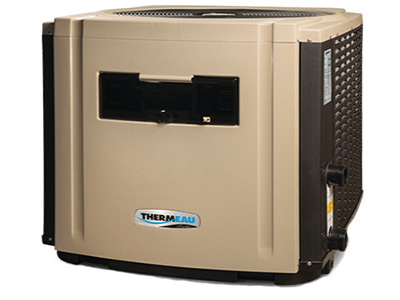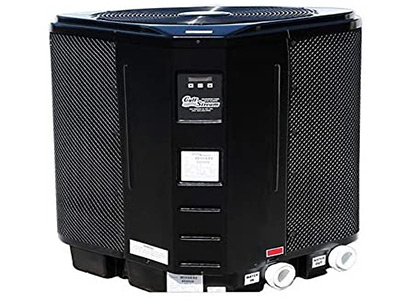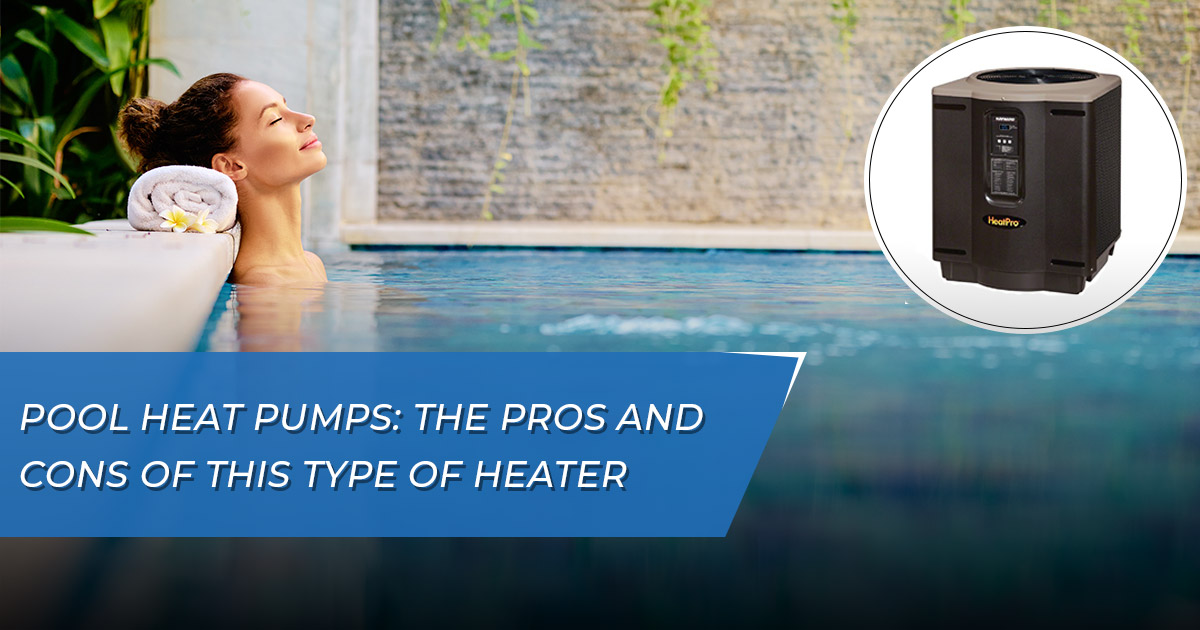Pool Heat Pumps: The Pros and Cons of This Type of Heater
When it comes to pools, most people envision using them to cool off by way of a nice dip on those hot summer days. However, you should also think about what you’re going to do if the temperatures start to drop outside, taking the temperature of the pool water down along with it.
That, in essence, is what pool heat pumps are designed to facilitate. They’re a crucial piece of equipment that can help make sure you’re always ready for a relaxing swim, no matter what. But what advantages do they bring with them, what are their potential downsides, and how are they different from something like a gas heater? The answers to those questions and more require you to keep a few key things in mind.
How Are Pool Heat Pumps Different From Gas/Propane Heaters?
 Perhaps the most important thing to understand about all of this is that pool heat pumps and gas or propane heaters aren’t just dissimilar. They’re actually designed for two very different purposes.
Perhaps the most important thing to understand about all of this is that pool heat pumps and gas or propane heaters aren’t just dissimilar. They’re actually designed for two very different purposes.
As the name suggests, a gas heater is one that heats the water in your pool in a more “traditional” way via propane or natural gas. During operation, it will pull water in and heat it up before releasing it back into the larger pool at the desired temperature.
The major difference between a gas or propane heater and a pool heat pump is that the former device operates by generating heat while the pool heat pump doesn’t. A pool heat pump will draw in existing heat from the surrounding air, at which point it will be compressed. Then, that compressed hot air is passed into the water, heating the pool as a result.
From that point of view, the major way in which gas heaters and heat pumps differ would be the energy source itself, as well as the heat production technique. Equally important to many people is the topic of eco-friendliness. Gas heaters by their very nature use a significant amount of gas to produce the heat necessary to get your pool’s water temperature where you want it to be. Pool heat pumps do not, thus making them the far more environmentally conscious choice of the two.
This also segues into another one of the major differences between these two types of heating devices: the time they take to operate. Because of the presence of said fuel source, gas heaters tend to function very quickly as long as that fuel source is present. Pool heat pumps will take far more time, meaning that you’ll need to keep them on for much longer before you’re able to take a dip, too.
Additional differences between these two types of heating devices include ones like:
- Longevity. Partially due to the way that they’re designed, gas heaters tend to have shorter overall life spans than their pool heat pump equivalent.
- Maintenance. Because gas and propane heaters have multiple moving parts, they tend to require more maintenance than pool heat pumps. Not only that, but those maintenance costs are usually higher as well.
- Temperature considerations. Because gas heaters heat up the water directly, the temperature outside makes no difference in terms of how well it can function. A heat pump, on the other hand, draws heat from the air to do its job. Therefore, if the weather dips below a certain temperature, it won’t function quite as efficiently as you may like.
- Fuel tanks and energy lines. When using a gas heater, you’ll need a large tank for the gas itself, and you’ll need to make sure it is properly refilled on a regular basis. Either that or you need to have a gas line installed to your pool. All a pool heat pump requires is an electrical hookup.
Finally, another major way in which pool heat pumps and gas heaters differ has to do with cost. Gas heaters are very common at pool supply stores, thus making them readily available. Likewise, the upfront cost of purchasing and installing the equipment itself is relatively low. This is especially true if there are already energy hookups in or around your pool. Pool heat pumps are the less common of the two options, and you can expect to pay more for installation as well.
Having said that, gas heaters ultimately cost more money in the long run because you have to keep buying enough fuel for their operation. Some estimate the cost of running a propane or natural gas heater at around $3 to $9 per hour, although that will obviously vary depending on your energy rates and the area of the country that you live in.
Pool heat pumps, on the other hand, will only use electricity during operation. Because of that, running them typically costs less than $1 per hour by most estimates.
Related Article: Thermeau Signature Heat Pumps: Product Review
The Pros and Cons of Pool Heat Pumps VS Gas and Propane Alternatives
 For many people, the biggest item in the “pro” category when it comes to swimming pool heat pumps has to do with the aforementioned cost considerations. Pools are already expensive – any opportunity to save a little money by way of lower operating costs is always welcome.
For many people, the biggest item in the “pro” category when it comes to swimming pool heat pumps has to do with the aforementioned cost considerations. Pools are already expensive – any opportunity to save a little money by way of lower operating costs is always welcome.
As long as you’re willing to wait a little longer for your pool to heat up and it isn’t a problem to run an electrical line to your pool area, you’ll likely end up saving money in the long run. This is true even though natural gas prices tend to be lower than electrical prices in a lot of areas. How each piece of equipment is being used has a much bigger impact than people realize.
Speaking of the “long run,” swimming pool heat pumps also commonly last far longer than the alternatives. Even going beyond the previously mentioned fact that gas heaters have more moving parts, pool heat pumps benefit from a “slow and steady” operation. They’re just gentler to operate, meaning that they go through less wear and tear by design. Even in the event that you do run into an issue, it will likely be less expensive to fix, too.
Of course, none of that is to say that swimming pool heat pumps aren’t without their potential downsides. In addition to the fact that they will take longer to warm up the water (meaning you can’t expect to turn them on a few minutes before guests arrive for that next pool party), you’ll also need to keep them running longer to maintain that water temperature. Depending on how often you use your pool, it’s easy to envision a situation in which your pool heat pump is on for most of the day.
As mentioned, those upfront costs will be greater for swimming pool heat pumps, too. The equipment itself is usually more expensive and is sometimes substantially so. Again, you can’t forget that even though they have similar goals, you’re still talking about two entirely different pieces of equipment. Likewise, if you don’t have a reliable 220-volt line already headed out to your pool, you’ll have to pay to have one installed by a professional. This will add to that upfront cost, so be prepared.
Related Article: Gulfstream Heat Pumps: Brand Review
Who Are Heat Pumps For?
Generally speaking, pool heat pumps are great options for pool owners who live in climates like Florida. They tend to be hotter all year-round, and, even if the air gets a little chilly sometimes, all you need is the right heat pump to get that water back to the exact temperature you want. Plus, you get to enjoy the added bonus of saving money in the long run.
Part of the reason why gas heaters tend to be popular has to do with how cold it often gets in other parts of the country. You’ll see a lot of pool owners use them to try to prolong the swimming season as long as possible before they close things up for the year. So while a gas heater may make perfect sense in a state that experiences all four seasons (or one where the temperature outside tends to drop below 50 degrees on a regular basis), in a place like Florida, swimming pool heat pumps are likely the way to go for most people.
The only factors that would largely remove them from consideration include your budget and not wanting to deal with those upfront costs or an inability to get the right type of electrical line hooked up due to conditions beyond your control.
In the end, there really is no “one size fits all” decision to be made when it comes to how you heat your pool water. Some people value speed and have the funds necessary to constantly make sure they don’t run out of natural gas. In that case, a gas heater would be ideal. For those who want to do their part to be as energy-efficient as possible (and who are willing to wait a bit longer for that ideal water temperature), pool heat pumps will do just fine.
Really, you need to start with your preferences and how you plan on actually using your pool and work your way back to the ideal solution. Only then will you be able to rest easy knowing that you’ve made the best choice possible for your home. At GPS Pools, we’ll help make sure that you understand all the options that are available to you to help make this decision as easy as possible.
Related Article: Thermeau Prestige Electric Heat Pumps: The Good, the Bad, & the Ugly
We are the Pool Heating Experts
Heat pumps are a great option to enjoy your swimming pool year-round. At GPS Pools, we want everyone to know the joy that comes with a comfortable, sparkling dip in the pool whenever you’d like. Whether you’re looking for the right pool heating installation services or heating products and aren’t sure where to begin or just want to make sure that all of your other pool equipment needs are properly taken care of, our passionate and experienced team members are here to help at one of our locations in Lutz, Land O’ Lakes, or New Tampa.

